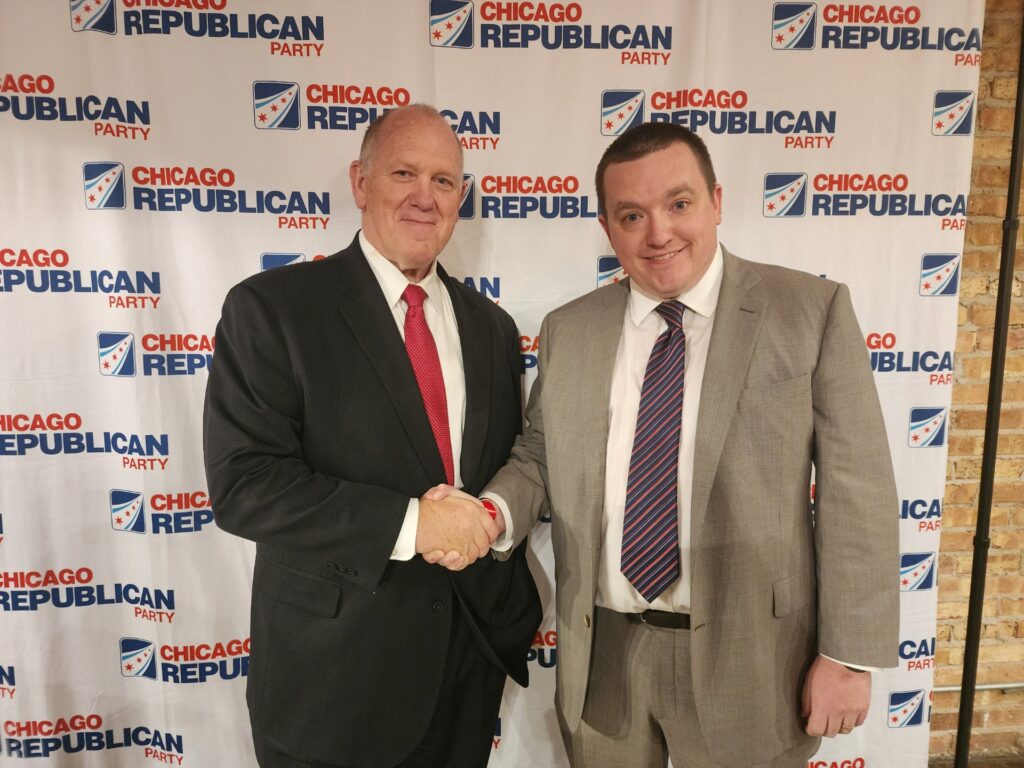ILLINOIS LEGAL NEWS & VIDEOS
Stay updated with the latest Illinois legal news and insights. Explore our collection of videos for in-depth analysis and commentary.
Attorney Heiderscheidt Attends Next ICE Director Homan’s Chicago Speeches on Immigration Policy Tom Homan

President-elect Trump’s pick to lead ICE beginning in 2025, spoke to several groups of supporters at different stops in the Chicago-land area Monday. Attorney Heiderscheidt attended both speeches. Homan repeated oft-used mantras about separating mixed-status families and deporting “illegal” criminal aliens. Homan stated that TPS for Venezuelans likely would be rescinded and called into question US asylum laws, alleging that 90% of claims result in a removal order rather than a grant of asylum or refugee status. “It wasn’t unexpected to hear some of these policy statements, but there were also glimmers of hope for some families,” John Heiderscheidt, Owner and Managing Attorney of Subscription Lawyer said, “Homan denied having the appetite to deploy military personnel to accomplish mass deportations. He also denied that immigration courts would be closed, leaving the door open for some due process rights, at least for non-criminals.” The incoming Presidential administration continues to make major changes in immigration law a top priority. If you or a loved one has questions about your rights or an immigrant in the United States, contact us today.
Some Immigrants May Benefit from New Attorney General Wrongful Conviction Unit
Illinois Attorney General Kwame Raoul has launched a statewide Conviction Integrity Unit (CIU) to address wrongful convictions and support county prosecutors in their efforts to investigate credible claims of innocence. This new initiative is particularly crucial for counties like Kane, where State’s Attorney Jamie Mosser has struggled to address wrongful convictions due to limited resources. Raoul’s statewide CIU, funded by the Attorney General’s office and a $1.5 million grant from the U.S. Department of Justice, aims to fill these gaps by providing centralized support to counties that lack the means for a dedicated unit.
The CIU will primarily review cases involving forcible felonies, where new evidence might exonerate individuals convicted in Illinois state courts. This unit holds particular significance for immigrants, who often face heightened consequences from wrongful convictions, such as deportation or impacts on immigration status. By revisiting cases with credible evidence, the CIU not only seeks to prevent wrongful imprisonment but also to protect immigrant communities from the unjust and life-altering effects of a conviction error.
Applications are available in English and Spanish, ensuring accessibility for incarcerated individuals across Illinois, including immigrant communities. The CIU’s collaboration with local state’s attorneys’ offices will help safeguard the rights of immigrants and promote trust and accountability within the justice system.
By providing both financial support and legal resources to investigate wrongful convictions, Illinois’s CIU reinforces the state’s commitment to a fairer, more inclusive criminal justice system that serves all residents equitably.
Attorney Heiderscheidt Leads and Immigration Rights Seminar
On November 1st, John Heiderscheidt hosted an Immigration Rights Seminar at the Institute for Cultural Affairs, where attendees discussed critical topics like Temporary Protected Status (TPS), Asylum, Work Authorization, and the CBP One app. With the 2024 election on the horizon, many participants voiced concerns about how a potential Trump presidency might affect immigration policy. Heiderscheidt provided guidance on navigating these uncertain times, emphasizing the importance of staying informed and proactive. The seminar was more than informational; it was a space for community and solidarity, where attendees shared unique stories and left feeling empowered to advocate for their rights.
A Day Downtown: DUI Cases and EOIR Hearings

DUI Case
A DUI (Driving Under the Influence) case can be complex, with serious consequences ranging from fines and license suspension to jail time. Every detail matters, from the legality of the traffic stop to the administration of sobriety tests. In this particular case, the court reviewed the evidence, and we navigated the various legal hurdles to ensure the best possible outcome for the client. DUI charges can have a significant impact on your life, so it’s important to have experienced legal representation to guide you through the process.
EOIR Master Calendar Hearings
In addition to the DUI case, I spent part of the day in two EOIR master calendar hearings. These hearings are the initial stages in removal proceedings, where the judge sets the tone for the case and determines next steps. It’s crucial for non-citizens facing immigration issues to have representation in these hearings, as the outcome can drastically affect their ability to stay in the United States.
If you or someone you know is an immigrant with questions about your legal status or if you’re facing removal proceedings, it’s important to understand your rights and the legal process ahead. Don’t hesitate to seek guidance from a qualified immigration attorney.
Reach Out Today
Legal matters can be overwhelming, whether you’re dealing with a DUI charge or immigration proceedings. If you are navigating the complexities of your legal status in the United States or facing charges like DUI, we are here to help. Call today for a consultation, and let’s work together to protect your rights and secure the best possible outcome for your case.
If you need legal guidance or have questions about your immigration status, please call today! We are here to provide the support and answers you need to move forward with confidence.
Rev. Jesse Jackson, Sr. Endorses Bob Fioretti for Cook County State’s Attorney
The recent endorsement of Republican Bob Fioretti for Cook County State’s Attorney by civil rights icon Reverend Jesse Jackson Sr. has sparked significant political debate in Cook County. Traditionally a strong supporter of Democratic candidates, Jackson’s decision to back Fioretti marks a significant departure and emphasizes the candidate’s civil rights record and history of community advocacy.
Jackson praised Fioretti as someone who has been a “champion” for the community through his roles as an alderman, civil rights lawyer, and advocate for the wrongfully convicted. He emphasized that his endorsement is not about party loyalty but rather choosing the right individual for the community, citing Fioretti’s commitment to “fairness, equality, and diversity”.
The endorsement has heightened scrutiny on Fioretti’s opponent, Eileen O’Neill Burke, a retired Illinois Appellate Court justice. Burke has been criticized for her handling of a racially charged case from the 1990s in which she prosecuted an 11-year-old African-American boy for murder, using what was later determined to be a coerced confession. This incident has been highlighted as disqualifying by Jackson, who cited it as evidence of racial bias.
The endorsement is also notable as it echoes some of the criticism Burke faced during the Democratic primary, where other prominent black Democratic leaders expressed concerns about her record. The race between Fioretti and Burke has become one of the more contentious local elections, with Jackson’s support potentially swaying voters in a predominantly Democratic county.
Fioretti, who has positioned himself as a centrist Republican, emphasized his commitment to law and order while respecting civil rights. His campaign is focused on building a “centrist movement” aimed at safer communities and a more just legal system.
Chicago’s Gun Violence in 2024: A City in Crisis
Gun violence continues to plague Chicago, with alarming statistics emerging in 2024. The city, often known for its rich cultural and historical significance, is struggling with increasing incidents of shootings. Many neighborhoods are caught in the crossfire, with the causes ranging from gang conflicts, drug-related crimes, to systemic socio-economic issues like poverty and lack of access to education.
The local government and community leaders are working tirelessly to address these problems, with initiatives focused on policing reform, community outreach programs, and investing in youth services. Yet, the challenge remains significant. Weekly updates track the escalating violence, revealing the harrowing reality many Chicagoans face daily.
Families in the most affected areas are calling for immediate action, from better gun control laws to more mental health resources. Community organizations are stepping up, providing safe spaces and educational opportunities, but without robust policy changes and better enforcement, the cycle of violence may persist.
Public figures, such as Mayor Brandon Johnson, are pushing for comprehensive solutions. However, balancing the safety of citizens with ensuring civil liberties remains a delicate act.
Chicago’s battle with gun violence isn’t just a local issue—it reflects broader national debates on gun control, police reform, and community-led safety measures. As we continue to track these developments, one thing is clear: ending gun violence in Chicago will require cooperation from every sector of society.
Attorney John Heiderscheidt Criticizes the Decision to Let ShotSpotter’s Contract Lapse

“It was a foolish decision to abandon Shotspotter technology, especially considering the Mayor is only now putting out an RFI to replace the technology,” said Attorney John Heiderscheidt of Subscription Lawyer. “His criticisms of the technology seem duplicitous and contradictory: if the technology is inherently bad because of surveillance, there’s no need for a replacement technology. If a replacement technology is necessary, the contract with Shotspotter should not have ended without an alternative place. This wrong decision will cost innocent victims their lives. Period.”
Attorney Heiderscheidt continued on, “The Mayor’s comparison of Shotspotter to a wasteful, walkie-talkie on a stick was the latest demonstration that he is completely unfit for the office he holds. The decision has led to near universal criticism in Chicago’s political circles. If the technology was good enough to keep party elites safe during the DNC, it is certainly good enough for all communities of Chicago. Day in and day out, this Mayor demonstrates total indifference to the well-being of regular, working-class Chicagoans and their families. Change cannot come to Chicago fast enough.”
Data on Shotspotter can be found here: https://justicetechlab.org/shotspotter-data/
Challenging the Immigrant Crime Narrative: Insights from Recent Research
Recent discussions surrounding crime rates and immigrant populations have often been driven by fear and misconception. A study highlighted by WTTW News has brought to light a disconnect between the narrative surrounding immigrant crime and the actual data, challenging long-held beliefs.
The research emphasizes that, contrary to popular opinion, immigrants are not inherently more likely to commit crimes than native-born citizens. In fact, many studies indicate that immigrant communities often experience lower crime rates. This contradiction raises questions about the narratives perpetuated in media and political
The study analyzes crime statistics and demographic information, revealing trends that suggest immigrants contribute positively to community safety and economic vitality. The findings indicate that areas with higher immigrant populations tend to have lower overall crime rates, underscoring the potential benefits of immigration.
Media portrayals often sensationalize crimes involving immigrants, creating a skewed perception. This study calls for a more nuanced understanding, urging policymakers to consider data-driven insights rather than rely on stereotypes. The implications of these findings are significant, especially in shaping immigration policy and public opinion.
Attorney Heiderscheidt Comments on P. Diddy Sex Trafficking Arrest
Given the images of law enforcement raids that we saw at Mr. Combs’ residence earlier in the spring, it should not surprise anyone that he has been indicted on certain charges related to sex trafficking and racketeering. The timing raises questions about whether there is some orchestration between the defendant himself and government authorities in a broader investigation. Time will tell.
The indictment signals that law enforcement has concluded most aspects of its investigation of Mr. Combs’ activities. It will now be for defense lawyers to use pretrial procedural tools as well as the trial system if they choose, in an effort to best help Mr. Combs address the situation so that he can avoid criminal liability totally, or, at the very least, avoid exceptionally harsh sentencing.
If you are an immigrant or citizen in the United State facing a criminal investigation or criminal charges in Cook, DuPage, Kane, Kendall, Lasalle or Will County, and you want to know about your rights, reach out to us at the contact tab on our website.
Attorney Heiderscheidt’s Statement on the Anniversary of 9/11:
Like virtually all Americans, I remember September 11 all too well. The horrific images of skyscrapers collapsing on innocent New Yorkers from all walks of life remain etched in my memory.
I remember the sadness, horror, and despair in people’s faces. At the start of the morning, we were a nation enjoying the longest peace dividend in modern history. By the afternoon we were a nation at war, with a then-faceless enemy.
September 11 changed the course of American and human history. But what I also distinctly remember is that Americans chose to come together and unite behind our oldest traditions and ideals In defense of our nation, our people, and our way of life. On that day we were not Republicans or Democrats, Liberals or Conservatives, far-left or far-right. We were just, Americans. Dazed, bloodied, in the fog of war, but brothers and sisters united in the instinctual need for cooperation for survival.
Twenty-three years later, we face another such moment in history. A second Cold War has reopened in Europe, and a great religious war is breaking out in the Middle East. Our dollar buys less than it ever has, and goods, services, energy, and gasoline cost more than ever before. Freedoms enshrined in the Bill of Rights are denigrated as potentially harmful to society.
As we navigate a world that presents unique challenges from a paradigm of multipolarity and shifting economic realities, we can best serve our own people by doubling down on our commitment to freedom, civil liberty, and the rule of law. Though the seas may remain stormy, a commitment to these principles will see us through any storm or swail as one people, under God, indivisible, to new ports of prosperity and happiness.
CATEGORIES
Categories
ARCHIVES
Archives
ABOUT SUBSCRIPTION LAWYER
Subscription Lawyer is a Chicago-based law office, ready to go to work for you. We offer legal services to all interested clients.
You do not need a subscription to work with us.
However, a subscription can be a wise investment if you foresee spending time in court for immigration, criminal, or civil matters in the future.


What Our Clients Are Saying...
WE MAKE IT EASY
How It Works
STEP 1
Make your initial deposit of
ONLY $500
and become a Subscription Lawyer client. Contact us to sign up!
STEP 2
Receive Benefits:
- A wallet-sized rights card
- 24 hour telephone number to request an attorney
- Access to "how-to" legal videos on common legal topics
STEP 3
Receive discounts on select legal services, sometimes up to 50%!
News / Videos

Have Questions? We are here to help!
Ready to Sign Up? Contact Us!
CONTACT INFORMATION
- Address: 7257 W Touhy Ave, Suite 201-A Chicago, IL, 60631
- Phone (English): (312) 331-0087
- Phone (Spanish): (872) 286-1172
- Email: info@subscriptionlawyer.com
-
Hours:
Mon - Fri / 10:00 AM - 5:00 PM
Sat / 10:00 AM - 3:00 PM



